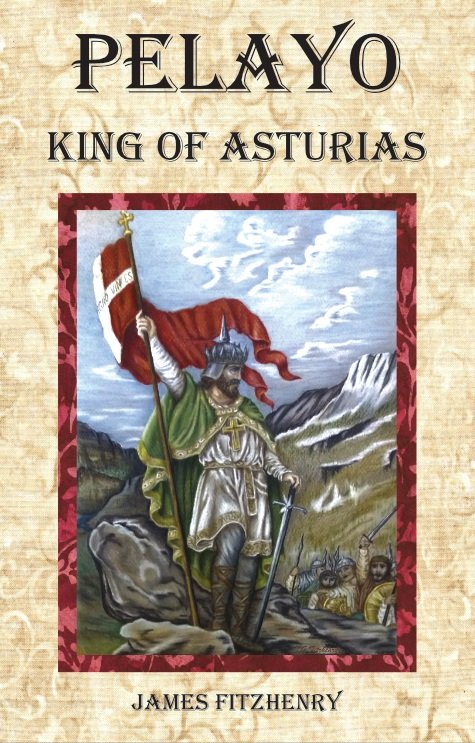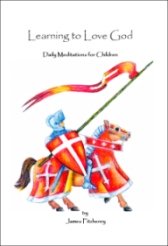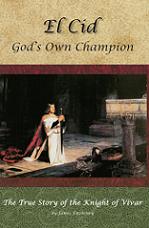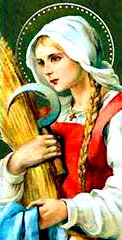
Saint Zita
Saint Zita of Lucca
(Santa Zita de Lucca)
Feast Day – April 27
Saint Zita of Lucca was a member of the Third Order of St Francis. Lucca is in Tuscany; and since the Third Order was widely propagated there after its founding, this holy servant girl of the thirteenth century would quite naturally join its ranks.
Zita was born at the village of Monte Sagrati in 1218, at the time that St Francis was entering upon his career as a knight-errant of Christ. Her parents were poor, devout Christians; an older sister afterwards become a nun; and her uncle Graziano was a saintly hermit.
When she was twelve years old, Zita went to Lucca, eight miles from her home, to be a servant girl of the Fatinelli family which carried on a prosperous wool and silk weaving business; and she remained in their employ until she died forty-eight years later.
Her daily work became a part of her religious life. She was wont to say:
“A servant girl is not pious, if she is not industrious; work shy piety is sham piety.”
At the same time she led a very prayerful and penitential life. She rose nightly for prayer; and daily she attended the first Mass in the adjacent church of San Frediano. The good food she received for herself she gave to the poor, and lived on waste scraps or fasted. She wore only the poorest clothes and never put on shoes, even in winter.
Saint Zita
For some years Saint Zita had much to bear from her fellow servants, who despised her way of life and insulted her repeatedly. Though she performed her work faithfully, her employers too were prejudiced against her for a time and treated her as a common drudge. But in the spirit of the suffering Christ, she bore these trials without complaint and never lost her temper or peace of mind.
During the time there was a local famine St Zita gave away beans to the poor and hungry from her master's supply of provisions. Not knowing what she was about, the master decided one day that the time had come to sell the beans for a great profit. Fearful of her master's anger, St Zita prayed to God for help. Then the master checked, finding that the supply of beans had not diminished. It could only have been a miracle of multiplication.
By her patience she gradually overcame all opposition, and became the friend and advisor of the whole household, including the servants. Her master and mistress, realizing at last what a treasure they possessed in Zita, made her chief house-keeper and the children’s nurse. This embarrassed her even more than the slights she had to bear during the earlier years. However, she fulfilled her duties so well that everyone fared so much better as a result.
Once St Zita stayed longer than she intended to at church. It was baking day, and as she traveled home she realized she was very far behind in her work. When she entered the kitchen to begin working, however, she found the bread placed in neat rows, ready to be baked. All she had to do was place it in the ovens.
When Lucca lay under an interdict from 1231 to 1234, Zita used to go on foot into Pisan territory to receive Holy Communion. These were dangerous trips at the time; but mysterious strangers befriended Zita on the way, and she was never molested. During the later years of her life, when she was relieved of much of the domestic work, she visited and helped the poor, the sick, and the prisoners to her heart’s content.
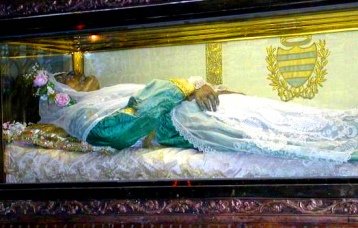
Absorbed in prayer, her eyes turned heavenward, and her hands crossed on her breast, she died on April 27, 1278, at the age of sixty. At the time, a brilliant star shone above her attic room.
After Saint Zita had been honored as a saint for four centuries, Pope Innocent XII formally approved this cult in 1696. She is the patroness of domestic workers.
from The Franciscan Book of Saints, edited by Marion Habig, OFM
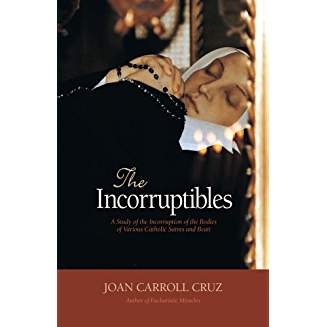
Continuously popular since it first appeared in 1977, TheIncorruptibles remains the acknowledged classic on the bodies of saints that did not undergo decomposition after death. Many remained fresh and flexible for years, or even centuries. After explaining both natural and artificial mummification, the author shows that the incorruption of the saints' bodies fits neither category but rather constitutes a much greater phenomenon that is unexplained by modern science to this day. The author presents 102 canonized saints, beati, and venerables, summarizing their lives, the discovery of their incorruption, and investigations by Church and medical authorities.
The incorruptible bodies of saints are a consoling sign of Christ s victory over death, a confirmation of the dogma of the Resurrection of the Body, a sign that the Saints are still with us in the Mystical Body of Christ, and proof of the truth of the Catholic Faith—for only in the Catholic Church do we find this phenomenon. Impr. 342 pgs 33 Illus, PB.
Return to Traditional Franciscan Calendar Page
Return to Incorruptible Saints Page
Return to Saints Page
Return to Roman Catholic Saints Homepage
NOW AVAILABLE!!
Pelayo's resistance initiated the nearly 800-year-long Reconquista to take back his country from the ruthless invader who had conquered his homeland and sought to erase his culture and his faith. His actions would lay the foundations of a Kingdom for Christ that would eventually reach around the world and spread the Catholic faith to millions of souls. Read more...
Please help us continue to bring high quality books to our readers at the lowest possible price! Click the link below! Thank you!
Now Available!
Defenders of Christendom
Battles - Honor - Miracles!
This book is filled with
amazing stories of little-known
Catholic heroes presenting
spectacles of bravery and
valor never exceeded in all the annals of history.
Demonstrating his
gallantry through daring feats
of arms, the knight's faith,
coupled with his marvelous
courage, made him nearly
invincible on the field
of battle.
read more . . .
Learning to Love God
Especially for young children -
Now available as an e-book!
Available for only $2.99 US
as an ebook download.
Also available in Spanish!
The exciting life story of
the holy Catholic knight
known as El Cid!
The amazing life story of the
little known incorrupt saint
- King Fernando III!
This highly acclaimed book is
inspirational to young men
and a guide to building a strong
masculine, Catholic character!
Also available as softback!



